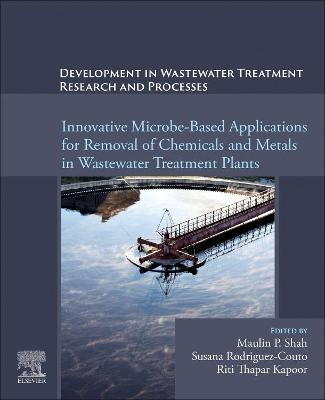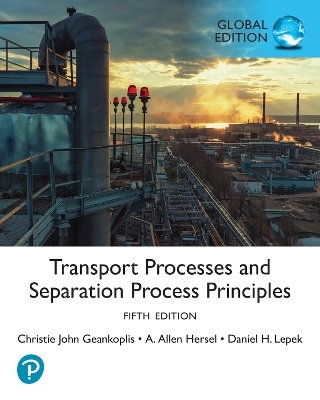
Development in Wastewater Treatment Research and Processes
Elsevier - Health Sciences Division (Verlag)
978-0-323-85657-7 (ISBN)
Maulin P. Shah is a Microbial Biotechnologist with diverse research interest. His primary interest is the environment, the quality of our living resources and the ways that bacteria can help to manage and degrade toxic wastes and restore environmental health. Consequently, His work has been focused to assess the impact of industrial pollution on microbial diversity of wastewater following cultivation dependant and cultivation independent analysis. Susana Rodríguez-Couto (female) got her B.Sc. and M.Sc. in Chemistry (Industrial Chemistry) from the University of Santiago de Compostela in 1992 and her Ph.D. in Chemistry in 1999 from the University of Vigo, obtaining the maximal grade (magna cum laude) and, in addition, she was awarded with the Extraordinary Prize for Doctoral Thesis in Chemistry. She worked as an Associate Professor and an Isidro Parga Pondal Senior Researcher at the University of Vigo (2000-2004), as a Ramón y Cajal Senior Researcher at Rovira i Virgili University (2004-2008) and as an Ikerbasque Research Professor (2009-2019). She has also worked as an Invited Researcher at the Institute from Environmental Biotechnology, Graz University of Technology (Austria) and at the Department of Biological Engineering, University of Minho (Portugal). In 2008, she received the I3 Professor from the Spanish Ministry of Science and Education to the recognition of an outstanding research activity. In March 2021 she is joining LUT School of Engineering Science at Mikkeli, Finland, as a Full Professor in biological water treatment. She has published more than 140 articles in highly reputed international journals (h index 42). She is editor of several journals (3Biotech, Frontiers) and 14 Elsevier books. Dr. Riti Thapar Kapoor is Associate Professor in Amity Institute of Biotechnology, Amity University Uttar Pradesh, Noida, India. Dr. Kapoor received her Ph.D from University of Allahabad and worked as post - doctoral fellow at Banaras Hindu University, Varanasi, India. Dr. Kapoor has fourteen years of teaching and research experience and her area of specialization is environmental biotechnology, bioremediation, wastewater treatment and abiotic stresses. Dr. Kapoor has published 11 books and over 105 research papers in various journals of national and international repute. Dr. Kapoor has visited 8 countries for participation in different academic programmes. Dr. Kapoor has received prestigious travel award from Bill & Melinda Gates Research Foundation under CGIAR project for participation in International training programme held at International Rice Research Institute (IRRI), Manila, Philippines in 2010. She is also recipient of DST travel grant for participation in International Conference held at Sri Lanka in 2013. Dr. Kapoor has been awarded with Teacher’s Research Fellowship from Indian Academy of Sciences, Bengaluru in 2019. She has supervised and mentored a number of research projects sanctioned by different government funding agencies such as DAE, DST and UPCST etc. She has successfully supervised three research students for Ph.D. degree besides several (more than 80) masters and graduate students for their dissertation thesis.
1. A comparative study between physicochemical and biological methods for effective removal of textile dye from wastewater
2. An approach towards developing clean green techniques to deal with heavy metal toxicity using the microbiome
3. Microbial degradation of Pesticides- Microbial potential for Degradation of Pesticides
4. Bio-Degradation and Photo-Catalysis of Pharmaceuticals in wastewater
5. Recent Trends in the Microbial Degradation and Bioremediation of Emerging pollutants in Wastewater Treatment System
6. Biological Methods for Textile Dyes Removal from Wastewaters
7. Importance and applications of biofilm in microbe assisted bioremediation
8. Microorganism: An eco-friendly tool for waste management and environmental safety
9. Microbial degradation of lignin: conversion, application, and challenges
10. Ligninolytic Enzymes: A Promising Tools for Bioremediation of Wastewater
11. Bioaccumulation and detoxification of Heavy Metals: An Insight into the Mechanism
12. Membrane Proteins Mediated Microbial Electrochemical Remediation Technology
13. Bioremediation Strategies to Overcome Heavy Metals and Radionuclides from the Environment
14. Microbial remediation of tannery wastewater
15. Biological Methods for Degradation of Textile Dyes from Textile Effluent
| Erscheinungsdatum | 29.10.2021 |
|---|---|
| Verlagsort | Philadelphia |
| Sprache | englisch |
| Maße | 191 x 235 mm |
| Gewicht | 1020 g |
| Themenwelt | Technik ► Umwelttechnik / Biotechnologie |
| ISBN-10 | 0-323-85657-8 / 0323856578 |
| ISBN-13 | 978-0-323-85657-7 / 9780323856577 |
| Zustand | Neuware |
| Informationen gemäß Produktsicherheitsverordnung (GPSR) | |
| Haben Sie eine Frage zum Produkt? |
aus dem Bereich


